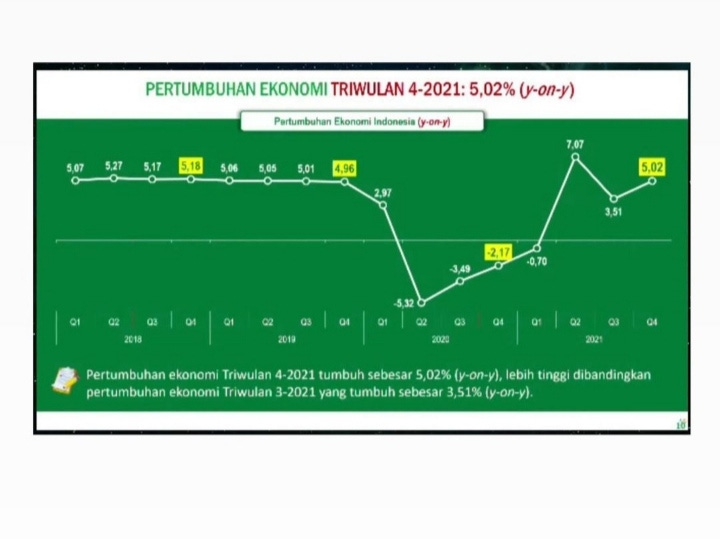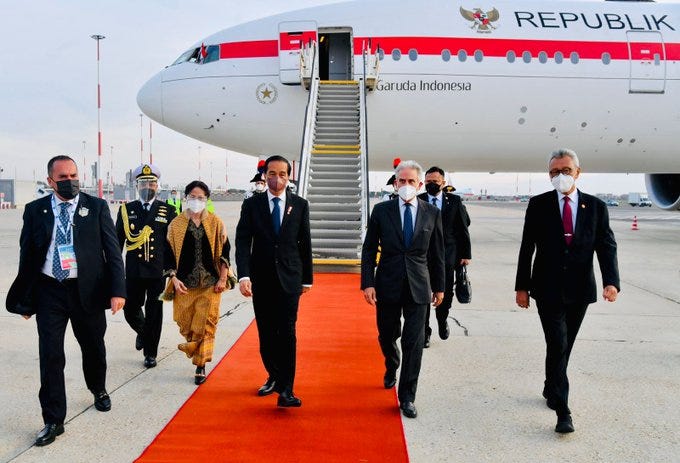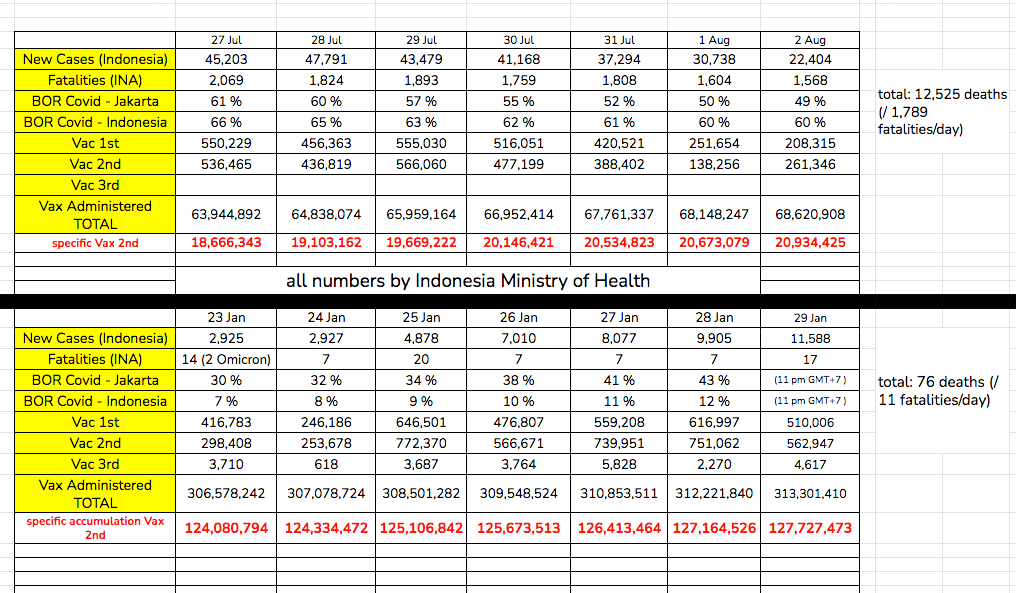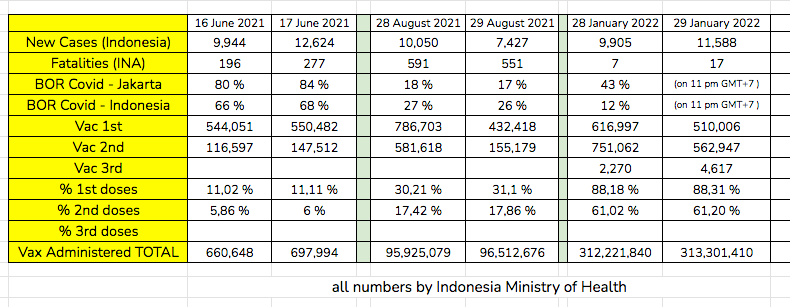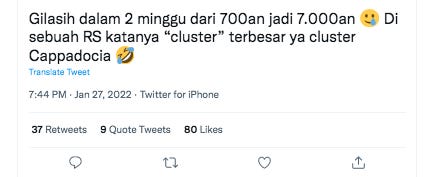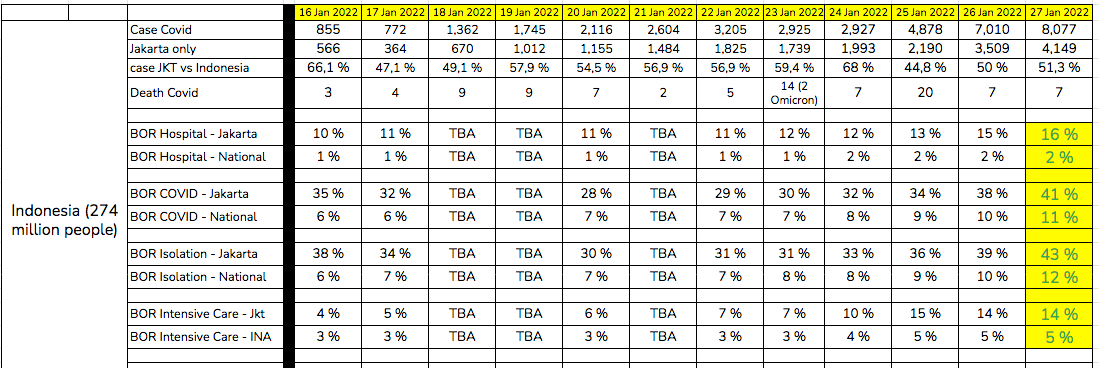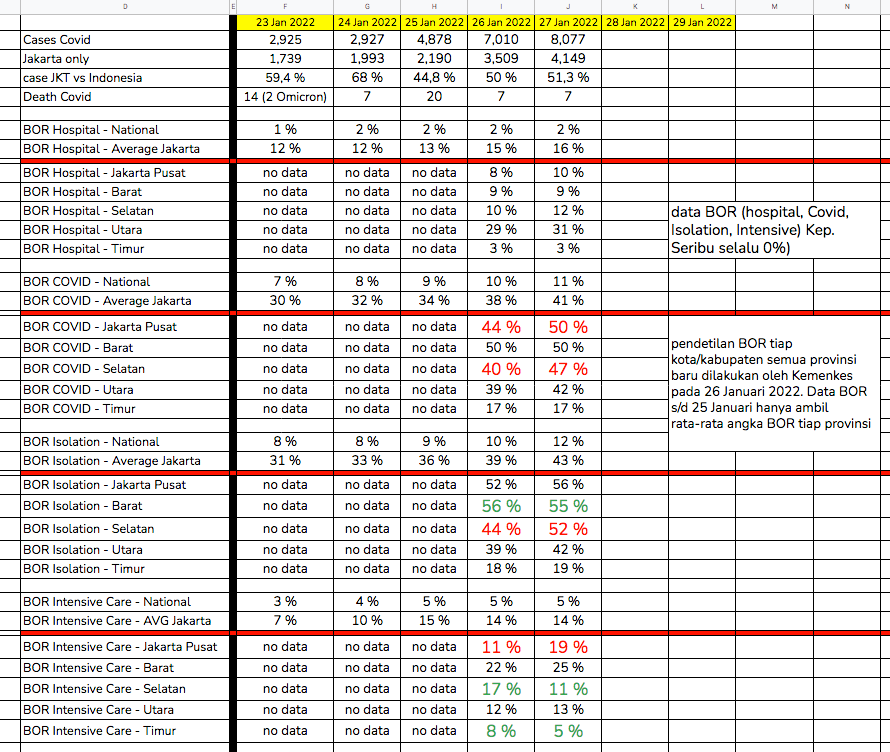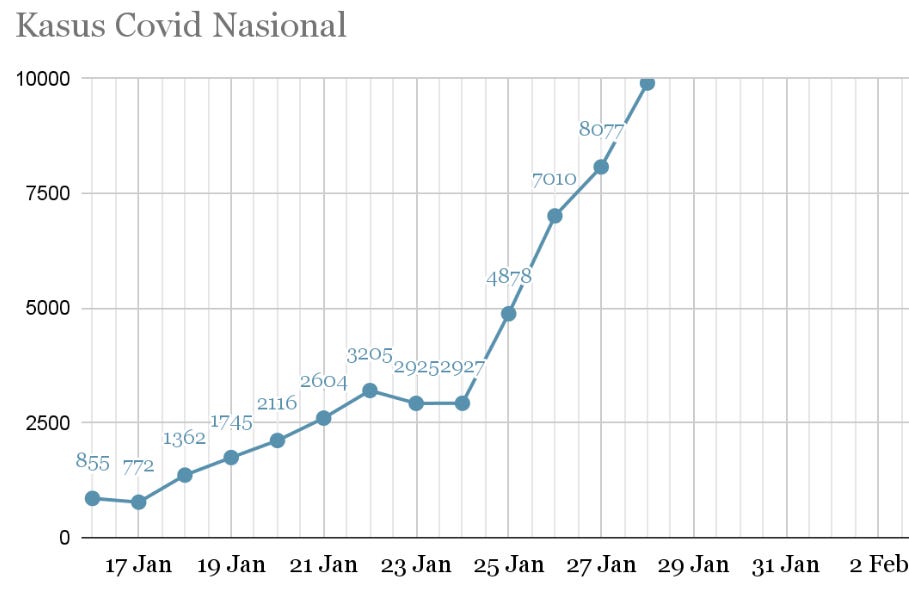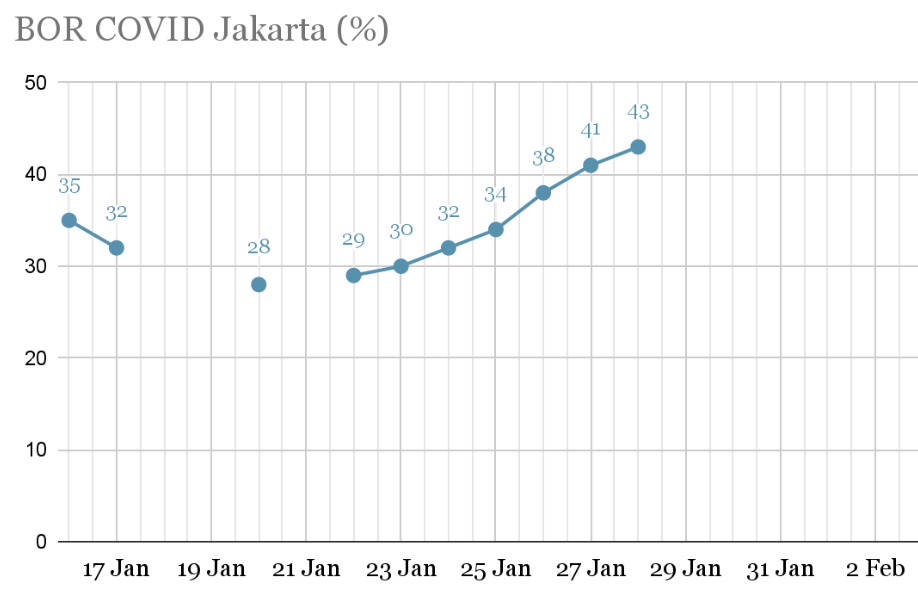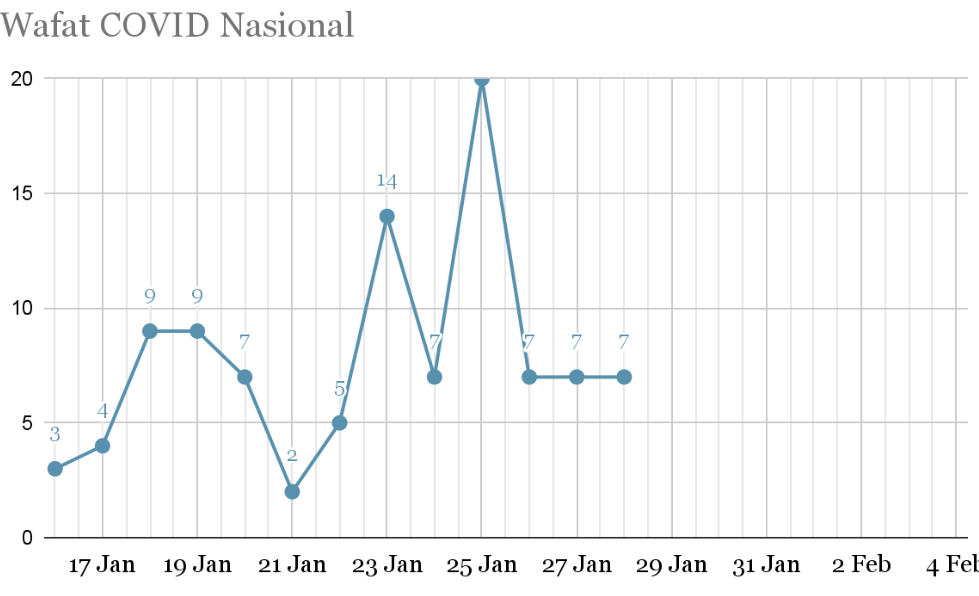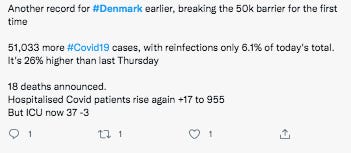Cost of Lockdown dan Wafat (Hanya) 1 Digit
Ditengah rasa pilu, bingung—-kepikiran bahwa “orang yang saya sayangi berada di bisnis yang ga mungkin lockdown, dan justru menjadi pemicu tersebarnya (lagi) covid di Indonesia” — yaitu turisme, saya kepikiran dengan pertanyaan yang amat bagus ini:
apakah ongkos restriksi/PSBB/PPKM/Semi-Lockdown sebanding dengan pencegahan kematian (agar terjaga serendah) 1 digit sehari dari seluruh Indonesia?
Setidaknya saya berusaha memakai banyak faktor untuk menjawab. Ibu Sri Mulyani menyatakan "Gara-gara Delta, itu jumlah belanja untuk membayar [perawatan] pasien itu mendekati Rp100 triliun, atau Rp94 triliun," saat rapat dengan Komisi XI DPR RI, Rabu (19/1/2022). Jika merujuk hanya pada 19 Januari 2022 saja, jumlah wafat Indonesia karena Covid19 (hanya) 9 jiwa, dengan jumlah kasus baru senasional (masih di angka) 1,745, dan kasus di Jakarta untuk pertama kali dalam 3 bulan melampaui 1000, yaitu 1,012.
Tapi ternyata Triwulan pada 2021 menunjukkan hal bagus…meski bukan amat bagus/naik signifikan memulih ekonomi misalnya:
Karena Sri Mulyani menyebut tagihan perawatan, sekalian saja pada 20 Januari 2022 lalu (karena data 19 Januari malah tidak ada-error di web kemenkes):
BOR Hospital senasional 1%; BOR Hospital Jakarta 11%
BOR Covid senasional 7%; BOR Covid Jakarta 28%
BOR Isolasi senasional 7%; BOR Isolasi Jakarta 30%
BOR ICU senasional 3%; BOR ICU Jakarta 6%
Saya bisa katakan bahwa angka vaksinasi kita unik: kita belum tinggi betul. Tidak bisa dibandingkan vaksinasi negara-negara maju. Jelas Indonesia punya disadvantage:
1} hanya kapita income 5k-6k an Dollar
2} tidak/bukan negara produsen vaksin global (sehingga ada beban lebih untuk pengadaan)
3} jumlah warganya 274 juta jiwa—yang artinya beban anggarannya sedemikian besar, terlepas “P” nya, Pendapatannya, harusnya (secara akumulasi) tetap besar–meski amat tergerus Covid.
Tidak bisa dibantah sama sekali —- ditengah ke-bodoamat warga Indonesia ga pakai masker dan turisme (duh Ndariii) ugal-ugalan, vaksin tetap amat efektif.
Per 29 Januari 2022, 1 dari 3 pasien ICU/BOR ICU di Jakarta adalah anak-anak (kurang lebih sebanyak itu itu). Hampir semuanya karena Covid. Mungkin sebagian kecil karena cedera PTM/pertemuan tatap muka sekolah.
1 dari 11 pasien kamar khusus Covid/BOR Covid (bukan semata ICU), adalah yang berwisata di Bali, domestik lainnya, dan atau luar negeri dari proses tracing. Per 29 Januari ini.
Saya berharap banget yang punya anak (karena ku belum #sedihbanget #tapimbaknyajugabelum #loh) segerakan vaksin anaknya.
Pada saat vaksin lengkap (2 dosis) cuma diterima 20an juta jiwa warga Indonesia, lalu varian DELTA, wafat Covid19 di Indonesia separah 1,789 per hari.
Januari 2022, kini, ada DELTA + OMICRON, vax 2 sudah 127an juta jiwa, separah apapun BOR, wafat kira-kira HANYA 11 (rata-rata), bisa lebih ditekan (angka wafat) jika makin banyak yang divaksin.
(6 jam lalu—-saya ga yakin seberapa banyak yang wisata ke Turki, karena Omicron Turki sudah ada sejak 9 November 2021, artinya WNI yang kesana memang nekad mati)
Maka jawaban lebih detail, ilmiah, ada penalarannya, mungkin bisa dirujuk dari “temannya” Bu Sri Mulyani (World Bank) yaitu IMF:
An International Monetary Fund (IMF) team led by Ms. Cheng Hoon Lim conducted virtual discussions on the Indonesian economy for the 2022 Article IV Consultation from January 4 to 24, 2022. At the end of the virtual mission, Ms. Lim issued the following statement:
“Indonesia has continued to respond with bold, comprehensive, and well-coordinated policy measures to protect lives and livelihoods from the impact of the COVID-19 pandemic, and to ensure a sustainable and inclusive recovery. While the pandemic, as elsewhere, has led to tragic loss of life and triggered a major economic downturn, the authorities’ measures have succeeded in maintaining economic and financial stability.
“The economy is recovering at a brisk pace. The Delta variant surge slowed the economic recovery in mid-2021, but growth picked up in the fourth quarter and is expected to strengthen over 2022−23. IMF staff project GDP growth at 5.6 percent for 2022 and 6.0 percent in 2023, supported by favorable global commodity prices, easing restrictions on activity, continued policy support, and rising mobility and confidence as the vaccination program expands into more remote areas.
“The balance of risks to the outlook is improving, but remains tilted to the downside. The emergence of more aggressive COVID-19 variants could put further pressure on the health system and lead to renewed mobility restrictions, and risks of spillovers from tighter global financial conditions have increased. On the upside, the boost from global commodity prices could last longer than expected, while recent and prospective structural reforms could reduce the extent of economic scarring in Indonesia.
“With the recovery underway, gradually restoring the central tenets of the pre-pandemic macroeconomic policy frameworks will reinforce Indonesia’s strong policy track record. However, the IMF team noted that if severe downside risks—such as a slower recovery or a rapid resurgence of COVID-19 infections and related containment measures—were to materialize, longer-lasting pandemic support could become necessary.
“The IMF team commended the authorities for their commitment to return to the budget deficit ceiling of 3 percent of GDP by 2023. The aim to consolidate public finances by phasing out emergency COVID-19 support, while accommodating the continued need for expenditure on health and social protection while the pandemic continues is appropriate. Moreover, the stronger-than-expected fiscal outcome in 2021 will lessen the trade-off between unwinding exceptional policies and providing adequate macroeconomic policy support. Despite the increased government borrowing amid the pandemic, Indonesia’s public sector debt remains low and would remain sustainable even if adverse macroeconomic shocks were to materialize.
“Inflation has remained lower than in other emerging and advanced economies, allowing Bank Indonesia (BI) to support the recovery through accommodative policies. Inflation is expected to rise gradually within the inflation target range in 2022. BI’s nimble policies are welcome, given fluid risks to inflation and the recovery, as is its move to gradually reduce excess banking system liquidity. If faced with adverse monetary policy spillovers, BI should preserve monetary policy space by allowing for greater exchange rate flexibility. The Fund team supports the authorities’ commitment to exit from monetary budget financing by the end-2022 target date, and recommends confining further primary market purchases under the market mechanism this year to periods of severe market dysfunction.
“The financial system appears sound, and the credit outlook is improving. A credit rebound in 2021 has been bolstered by accommodative monetary and macroprudential policies, as well as improved access to government guarantees for bank lending to MSMEs and corporates. Asset quality risks have generally declined with the economic recovery but are still elevated in sectors hard-hit by the pandemic. While crisis-related measures are still in place, intensive supervision will be required to ensure prudent lending.
“The authorities have continued to implement their structural reform agenda despite the difficult context posed by the pandemic. The 2021 tax reform bill is an important step toward addressing Indonesia’s low revenue intake, and the introduction of a carbon pricing scheme is an important step towards climate change mitigation. Going forward, both should be reinforced by further and broader reforms, including the development of a comprehensive medium-term revenue strategy and reforms to energy subsidies and pricing. Private sector activity and investment will be bolstered by last year’s omnibus law on job creation, and its impact could be enhanced by complementary reforms such as improvements to education, infrastructure, and efforts to strengthen governance frameworks.
“The IMF team met with officials in the government, Bank Indonesia, Financial Services Authority (OJK), other public agencies and representatives of the private sector and civil society. The team would like to thank the authorities and other interlocutors for the frank and constructive discussions in the virtual meetings, as well as for the logistical support.”
(semua bisa dibaca lagi di :
https://www.imf.org/en/News/Articles/2022/01/25/pr2212-indonesia-imf-staff-completes-2022-article-iv-mission-to-indonesia
Kita amat beruntung. Tidak ada satupun negara diatas 100 juta jiwa yang wafatnya harian hanya satu digit sebegitu sering sejak Omicron muncul (sekitar 4/5/6 November di suatu RS Belanda—bukan yang di Durban Afrika Selatan). Sejak Mei 2020, Jokowi sudah menyebut bahwa manusia, siapapun harus bisa berdampingan (coexist) dengan Covid. Ucapan yang dihina warganya sendiri, bahkan juga kepala negara lain. Belakangan, negara-negara maju, akhirnya membuka diri dan tak (sanggup) lagi Lockdown. terbaru yaitu Denmark, negara yang jika secara populasi dibagi dengan jumlah kasus harian, sebetulnya paling parah se-Eropa, akhirnya ga sanggup lockdown.
Aku sayang kamu, mbak-mbak Nyhavn Denmark. cepetan vaksin, Ndari…. #laaahhh




